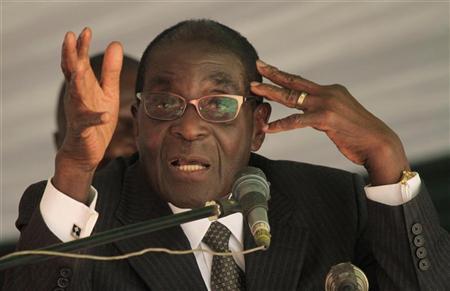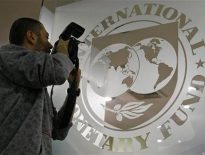By Adrian Croft
BRUSSELS (Reuters) – The European Union lifted curbs on aid to Zimbabwe on Monday and held out the prospect of removing sanctions from Zimbabwean officials to encourage political reform – though not from President Robert Mugabe and his inner circle.

EU foreign ministers meeting in Brussels lifted the aid restrictions with immediate effect but said a broader relaxation of sanctions would depend on a referendum on constitutional changes due this year in Zimbabwe being “peaceful and credible”.
The step is part of the West’s strategy of rewarding Zimbabwe’s uneasy coalition government for progress made since a disputed 2008 vote, while keeping up pressure on veteran leader Mugabe to carry out more political, economic and social reforms.
A spokesman for Mugabe’s ZANU-PF movement said the EU’s decision proved his party’s long-held view that Zimbabwe was under economic sanctions, and that a case the southern African country filed last month with the General Court of the EU challenging the sanctions was valid.
“We are happy on one hand that our case is being validated, but we are unhappy on the other hand that they are retaining some of the illegal, immoral and unjustified sanctions which are based on falsehoods,” spokesman Rugare Gumbo said.
Asked whether ZANU-PF would implement more political reforms to get the remaining restrictions removed, Gumbo said: “We want all these sanctions removed because they are illegal, but we will never allow anyone to interfere in our domestic affairs. If there are processses here, we do them for the good of Zimbabwe, not to please foreigners.”
Citing moves by Zimbabwe’s government of national unity to “improve the freedom and prosperity of the Zimbabwean people”, the EU ministers said on Monday the union would end its ban on sending development aid directly to the Harare government.
The bloc currently provides about 100 million euros a year in aid to Zimbabwe through non-governmental organisations.
The bloc will resume direct dealings with Harare under a new EU aid agreement for developing countries due to start in 2014, the ministers said. The change affects only EU aid, not money given directly by EU member states.
Further easing of EU sanctions will depend on the holding of a fair referendum on a new constitution, seen as a key precursor to an election expected in 2013, the ministers said. The new constitution would limit the power of the president and strengthen that of parliament .
A “peaceful and credible constitutional referendum…would justify a suspension of the majority of all EU targeted restrictive measures against individuals and entities,” an EU statement said.
EU diplomats said there was no immediate prospect of rescinding sanctions on Mugabe and his inner circle.
The European Union removed some Zimbabweans from its sanctions list in February, but 112 people and 11 organisations remain affected by asset freezes or travel bans.
Mugabe is one of Africa’s longest-ruling leaders and has been accused of hanging onto power through vote-rigging. The 88-year-old has denied reports of ill health and says he is fit enough to contest the next presidential election.
Britain, the former colonial power which regularly spars with Mugabe, said it had proposed the EU move, which Foreign Secretary William Hague said represented a “step change in the EU’s approach to Zimbabwe”.
“This approach will demonstrate to reformers across the political spectrum that the EU is serious about responding to concrete progress on the ground,” he said in a statement.
Luke Tamborinyoka, a spokesman for Mugabe’s rival, Prime Minister Morgan Tsvangirai, said he welcomed the EU decision: “The Prime Minister supports the suspension of the restrictions that are tied to key reforms towards free and fair elections.”
Zimbabwe political analyst Eldred Masunungure said the EU measures would help the country’s reform process and rob Mugabe of his argument that aid sanctions are hurting ordinary people.
“ZANU-PF is trying to come back from the cold and it knows it will need to accept some minimum political reforms, and it is something that is happening, slowly and sometimes painfully.”





